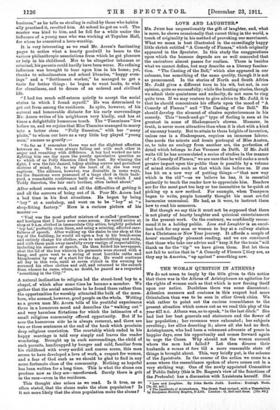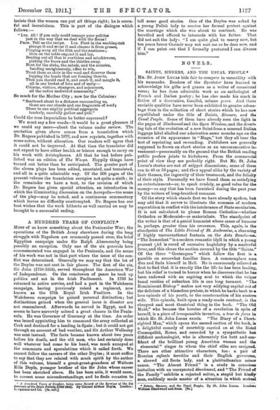THE WOMAN QUESTION IN ATHENS.t
WE do not mean to imply by the title given to this notice that there was in the Athens of Aristophanes an agitation for the rights of woman such as that which is now forcing itself upon our notice. Doubtless there was some discontent : Athenian manners and customs in this respect had more Orientalism than was to be seen in other Greek cities. We wish rather to point out the curious resemblance to the present situation which comes out as we read this play of the year 411 B.c. Athens was, BO to speak, "in the last ditch." She had lost her best generals and statesmen and the flower of her population ; her revenues were exhausted ; her subjects revolting ; her allies deserting it; above all she had no fleet. Aristophanes, who had been a vehement advocate of peace in happier days, sees his opportunity and comes forward again to urge the Cause. Why should not the women succeed where the men had failed P Let them divorce their husbands a mensa et Coro till a more reasonable state of things is brought about. This, very briefly put, is the scheme of the Lysistrata. In the course of the action we come to a scene where the resemblance spoken of above comes out in a very striking way. One of the newly appointed Committee of Public Safety (this is Dr. Rogers's view of the functions of the Probouloi) has a discussion with Lysistrata herself. She
• Lone and Laughter. By John Savile Judd. London : Eveleigh Nash. [Se. 6d. net.]
The Lysistrata of Aristophanes. The Greek Text revised, with a Translation by Benjamin Bickley Rogers. D.Litt. London: G. Bell and SOUS. [10s. 6d.]
insists that the women can put all things right; he is scorn-
ful and incredulous. This is part of the dialogue which follows :-
" Lys. Ah ! if you only could manage your politics just in the way that we deal with the fleece 1
Paws. Toll us the recipe. Lye. First in the washing-tub
plunge it and scour it and cleanse it from grease, Purging away all the filth and the nastiness ; then on the table expand it and lay, Beating out all that is worthless and mischievous, picking the burrs and the thistles away.
Next for the clubs, the cabals, and the coteries,
banding unrighteoualy, office to win, Treat them as clots in the wool and dissever them lopping the heads that are forming therein. Then you should card it, and comb it, and mingle it,
all in one basket of love and of unity—
Citizens, visitors, strangers, and sojourners, all the entire undivided community."
So much for the Mother City ; now for the Colonies :
" Scattered about to a distance surrounding us, those are our shards and our fragments of wool; These to one mighty political aggregate tenderly, carefully gather and pull."
Could the true Imperialism be better expressed P We must say a few words—it would be a great pleasure if we could say more—about the volume under review. The quotation given above conies from a translation which Dr. Rogers published in 1878, and now reprints, together with some notes, without alteration. Our readers will agree that it could not be improved. At that time the translator did not expect to have either health or leisure enough to carry on his work with Aristophanes. All that he had before pub- lished was an edition of The Wasps. Happily things have turned out better than he anticipated. The greater part of the eleven plays has been edited, annotated, and translated, and all in a quite admirable way. Of the 300 pages of the present volume the translation occupies not quite a sixth; in the remainder we have a text, to the revision of which Dr. Rogers has given special attention, an introduction in which the illuminating discussion on the Acropolis—the scene of the play—may be noted, and a continuous commentary which leaves no difficulty unattempted. Dr. Rogers has our best wishes that the work hitherto so well carried on may be brought to a successful ending.



































 Previous page
Previous page